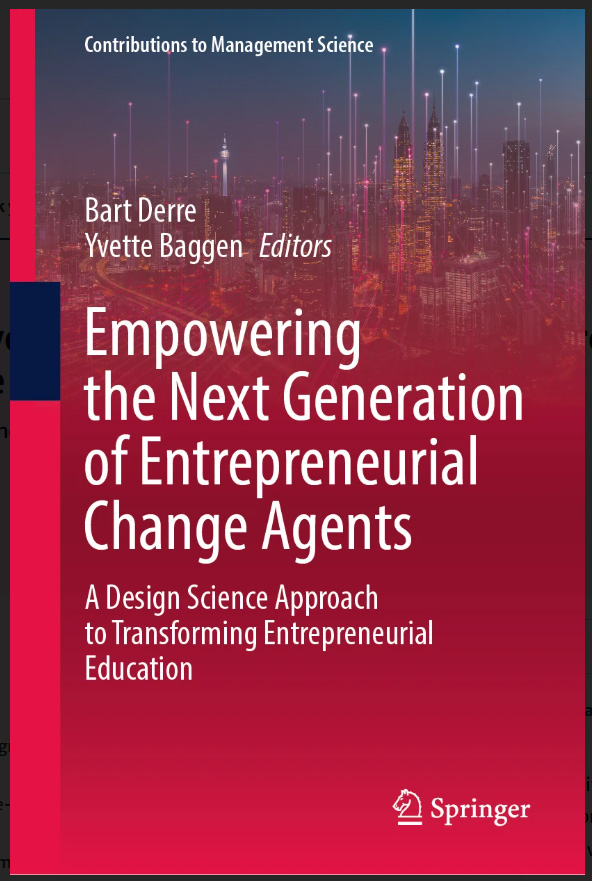You are warmly invited to the launch of the Springer book “Empowering the Next Generation of Entrepreneurial Change Agents: A Design Science Approach to Transforming Entrepreneurial Education”, edited by Bart Derre (HOGENT/VUB) and Yvette Baggen (WUR) at TU/e innovation Space (Eindhoven). This book introduces an innovative approach to designing, implementing, and evaluating entrepreneurial education that prepares change agents capable of driving societal transformation towards sustainability.
Our keynote speaker Rianne Poot, the director of the Utrecht University Centre for Entrepreneurship & Playground, will provide an interactive reflection on the book. Rianne is an entrepreneurial change agent herself. She is a firm believer that students in any discipline benefit from internalizing an entrepreneurial mindset. Students need to feel safe enough to try out new ideas, fail a few times and learn how to get up. To facilitate this, we need to design entrepreneurial education and educational spaces to help students develop these skills. This is why, in the face of complex institutional dynamics, Rianne opened and currently manages a space for broad entrepreneurial education in a non-technical research university. Shaping it as a safe space for students, teachers and externals alike to work on projects with value for society.
Just like us, Rianne aims to continue empowering the next generation of entrepreneurial change agents. Questions we care about and would like to consider during the interactive keynote are, for instance: What does it mean to be a change agent in higher education? What does the book offer you as a change agent? How does it help you – either if you are a researcher, teacher, policymaker, or other stakeholder – to design entrepreneurial education? And what opportunities and challenges do we see for the future?
The launch event is a fantastic opportunity to reflect together with Rianne and the team of authors on such questions and to connect with like-minded educators, researchers, policymakers, and other stakeholders.
Registration and programme
Don’t miss out on the opportunity to be part of a transformative movement in entrepreneurial education. More information is found here.
About the book
Discover how this book redefines entrepreneurship beyond traditional business boundaries, focusing on sustainable impact and value creation. It offers a wealth of theories, tools, and models to deepen your understanding of a design science approach to education. You’ll also find concrete cases and practical guidelines to apply these concepts in your own teaching. The book also features insights from an international team of authors, making it a comprehensive resource for educators worldwide.
In an era defined by volatility, complexity, and uncertainty, educating future-oriented change agents is essential to address pressing societal challenges such as climate change and the transition to a circular economy. These change agents play a pivotal role in driving societal transformation, requiring a mindset and skills suited to navigating complex problems and adapting to environments full of uncertainty. Entrepreneurial education emerges as a critical lever in fostering such capabilities, integrating seamlessly into higher education and lifelong learning contexts to prepare change agents for active, constructive participation in societal transitions.
This book introduces a design-science research approach to entrepreneurial education, emphasizing the design, implementation, and evaluation of educational practices tailored to diverse contexts.
Real-life case studies illustrate how the design-science approach has been successfully applied, offering practical insights for educators and researchers aiming to enhance their own research and teaching practices.
By connecting theory to practice, the design-science approach offers a fresh perspective on entrepreneurial education. It not only unpacks the mechanisms behind effective program design but also fosters innovation through continuous, data-driven cycles of collecting and processing feedback. This approach ultimately enables the development of evidence-based entrepreneurial education that prepares change agents capable of driving the necessary societal transformation across contexts.

Click here to read more about the book.